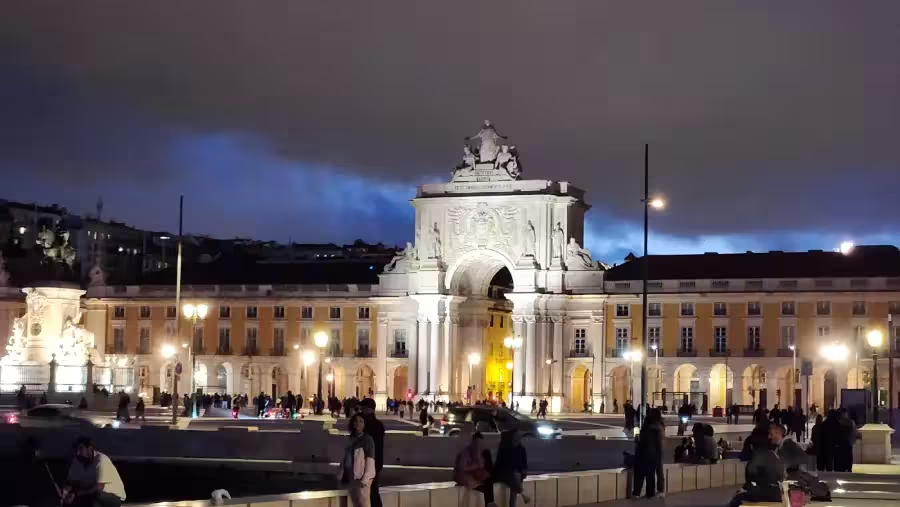
Table of Contents
Toggle5 DAYS IN LISBON
Lisbon: The Capital of Portugal
Lisbon’s history stretches back over 2,000 years. It was originally settled by the Phoenicians around 1200 BCE, who named it Olisipo . Later, the Romans conquered the area and renamed it Felicitas Julia , developing it into a significant port and administrative center.
Moorish Influence
In 711 CE, the Moors invaded the Iberian Peninsula and transformed Lisbon into a thriving Islamic city.
They introduced advanced irrigation systems, architecture, and culture, leaving behind a lasting legacy visible in the city’s narrow streets and tiled facades.
Reconquista and Rise to Prominence
Lisbon was recaptured by Christian forces in 1147 under King Afonso Henriques, marking a turning point in Portuguese history.
The city became the capital of the newly formed Kingdom of Portugal and grew rapidly during the Age of Exploration. Under Manuel I (r. 1495–1521), Lisbon flourished as the epicenter of global trade routes, bringing wealth from Africa, Asia, and the Americas.
Earthquake and Rebirth
The Great Lisbon Earthquake of 1755 devastated much of the city, killing tens of thousands and destroying iconic landmarks. However, under the leadership of the Marquis of Pombal, Lisbon was rebuilt with innovative urban planning and earthquake-resistant designs. This marked the beginning of modern Lisbon.
Contemporary Era
Throughout the 20th century, Lisbon faced challenges such as economic instability and dictatorship but emerged stronger after the Carnation Revolution of 1974. Today, it is a vibrant, cosmopolitan city blending tradition with innovation.
GOING TO LISBON
To go to Lisbon, we took the train, it cost 27 Euro or 31 US dollar for one way, and the trip last about 3 hours.
You arrive at the Lisboa Oriente train station, very convenient, from there you can take the metro to your hotel.
Transportation in Lisbon.
Is very similar than the Porto system.
The metro is very convenient, you have to buy the card, which cost 0.50 Euro and each trip cost 1.85 Euro,
Also there is the Lisboa card, you have a choice for 24, 48 or 72 hours.
The 24 hours cost 31 Euros, 35 US dollar, the 48 hours 51 Euros, 59 US dollar and the 72 hours 62 Euros, 71 US dollar, you can use for the bus and the metro, the Tram 12 and 28, and the 15E to go to Belem and some trains, like to go to Sintra
The card also give free entrance for more than 52 museums and visitor attractions.
The card can be purchase at any official tourism information stores.
Basically there is 4 metro line, the green, blue, yellow and red.
The red one is the one go to the airport
Metropolitano de Lisboa, EPE – English
ATTRACTIONS:
Praça do Comércio
Praça da Figueira
Belem Tower
Museu do Combatente Belem
Jerónimos Monastery
Castelo de São Jorge
Santa Justa Tower
Covento do Carmo
Santa Lucia
Where to stay in Lisbon.
We personally stayed at the Evolution Valbom hotel, it’s 4 stars hotel.
The price per night was 140 Euro or 160 US dollar.
The hotel have a very good location, it’s on the metro red line, same line to the airport.
The hotel is at the S.Sebastiao station.
From the S.Sebastiao station, the hotel is just 5 min walk.
If you need to go to the airport from the S.Sebastiao station it takes about 30 minutes and is direct to the airport.
What to see
Praça do Comércio
Praça do Comércio, also known as Terreiro do Paço, is one of the most iconic squares in Lisbon. Situated by the Tagus River, this expansive plaza serves as a magnificent entrance to the city.
Originally built in the mid-18th century after the 1755 earthquake, it was designed as a royal palace’s waterfront façade.
Today, it stands as a testament to Lisbon’s resilience and architectural prowess.
The square is bordered by impressive neoclassical buildings, with the majestic Arco da Rua Augusta at its northern end.
This archway, adorned with intricate sculptures and carvings, commemorates the city’s recovery after the devastating earthquake.
Praça do Comércio is not just a historical site, it is also a bustling hub of activity.
The square is lined with cafes and restaurants, inviting visitors to relax and enjoy a meal while soaking in the atmosphere.
Street performers and local vendors often add to the vibrant environment, making it a popular gathering place for both locals and tourists.
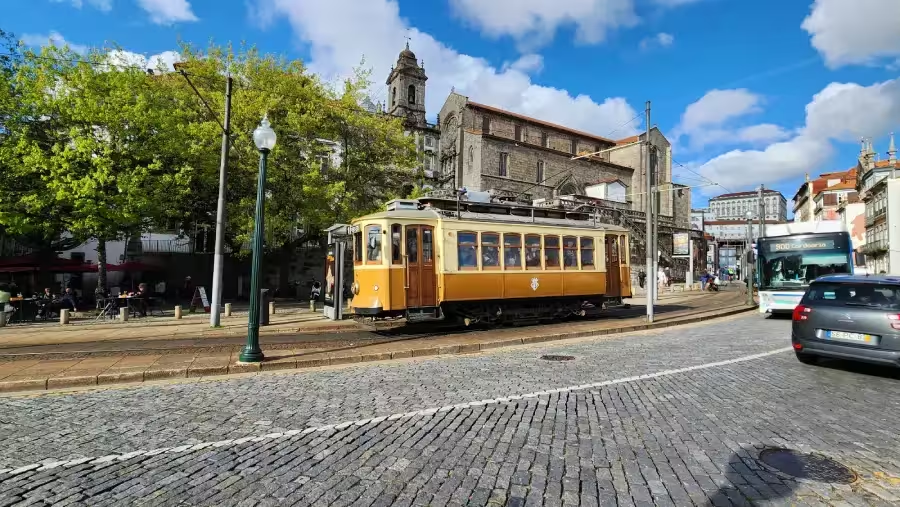
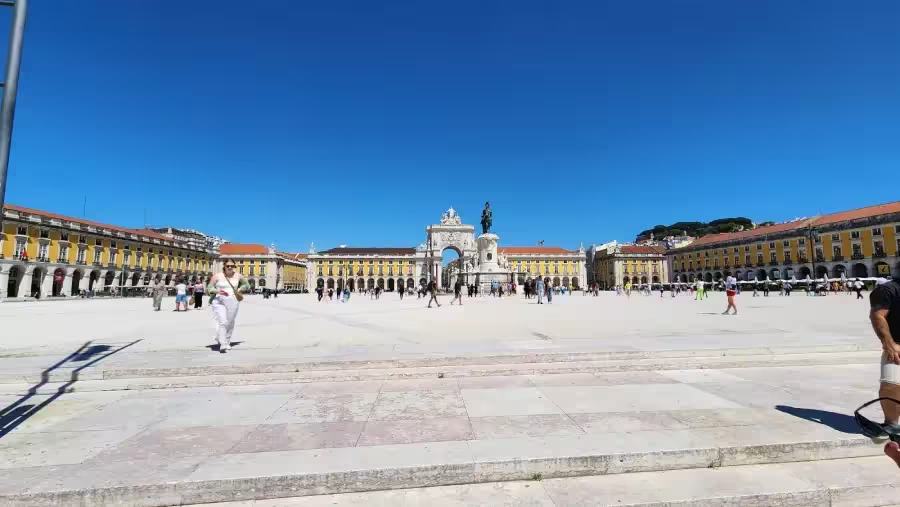


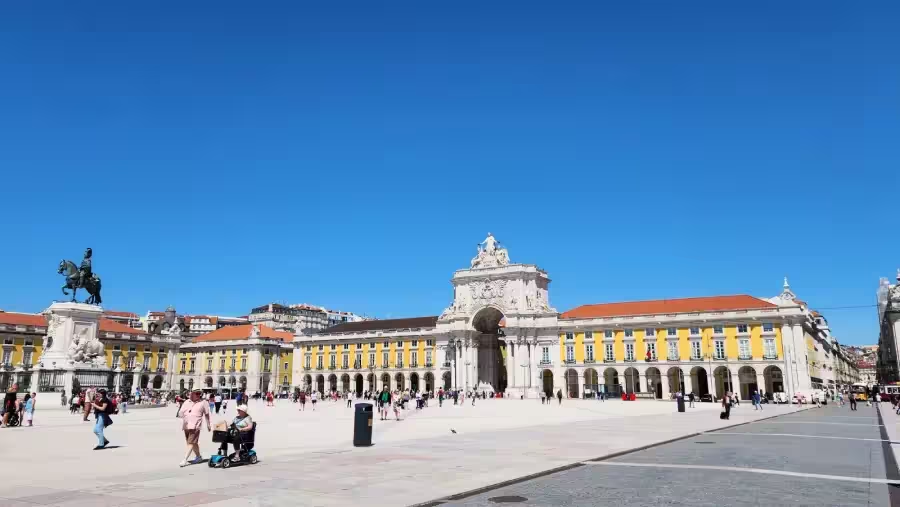
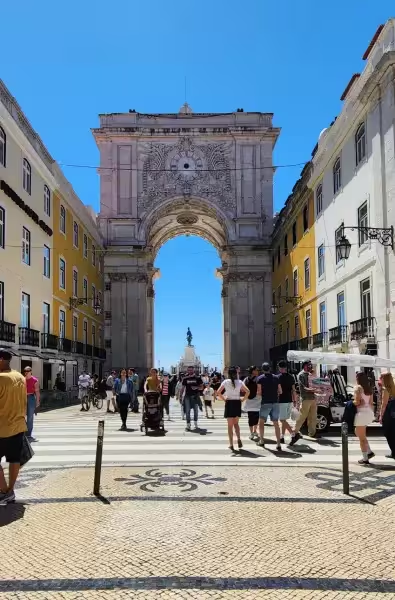
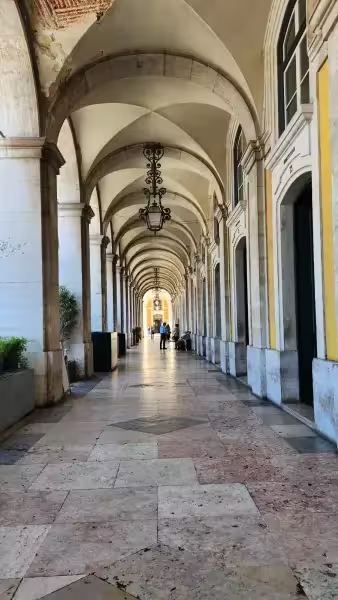
Praça da Figueira
Moving towards the heart of Lisbon, we find Praça da Figueira, a lively square that reflects the city’s character.
Named after a fig tree that once stood in the area, this square is a central point for transportation and is surrounded by notable buildings, including the historic Rossio Train Station.
Praça da Figueira is also known for its dynamic atmosphere. The square is often filled with markets, street fairs, and cultural events, showcasing local artisans and products.
It’s a perfect spot to immerse yourself in Lisbon’s local culture, with many food stalls offering traditional Portuguese delicacies, from pastéis de nata to grilled sardines.
The square is conveniently located near several attractions, making it an ideal starting point for exploring the city.
Just a short walk away is the beautiful São Jorge Castle, offering stunning views of Lisbon.
The nearby streets are filled with shops, cafes, and historical landmarks, ensuring that visitors have plenty to see and do.
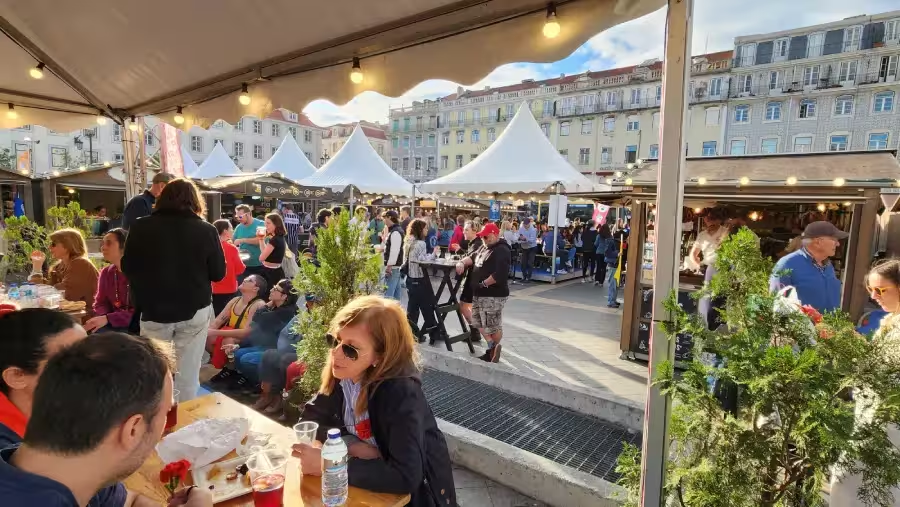
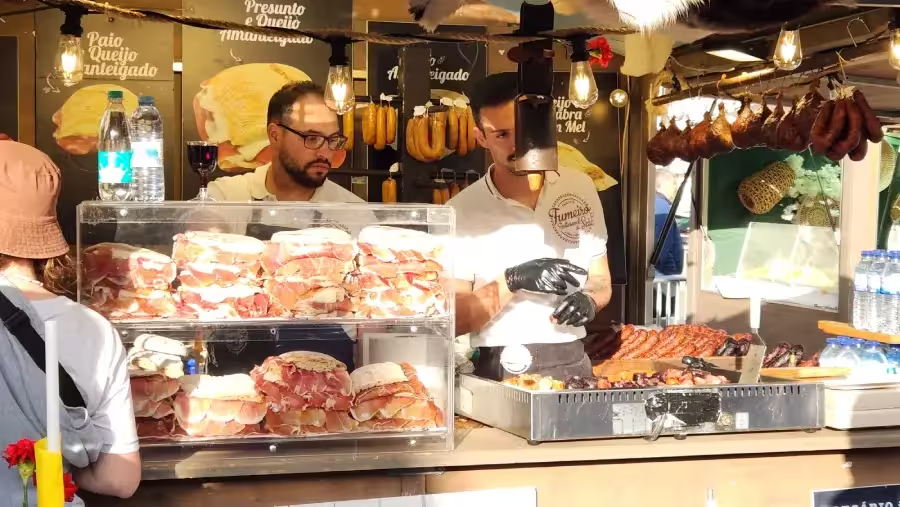
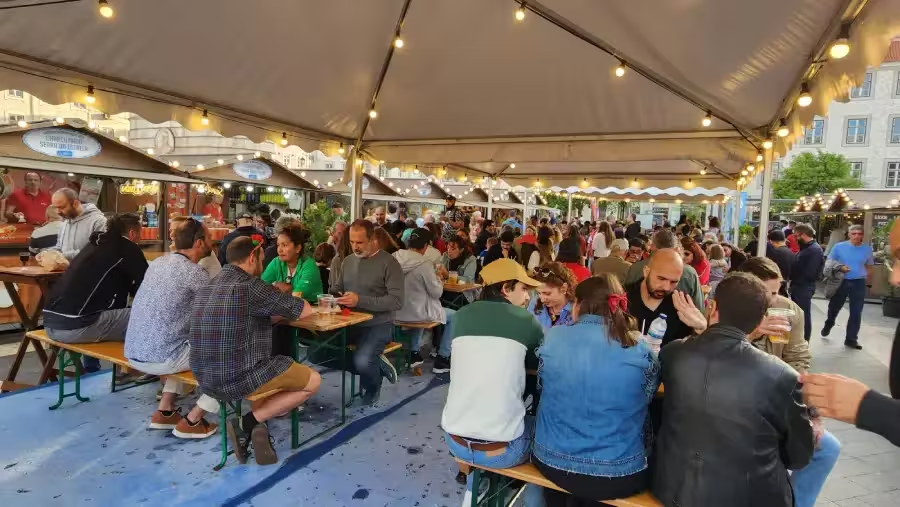
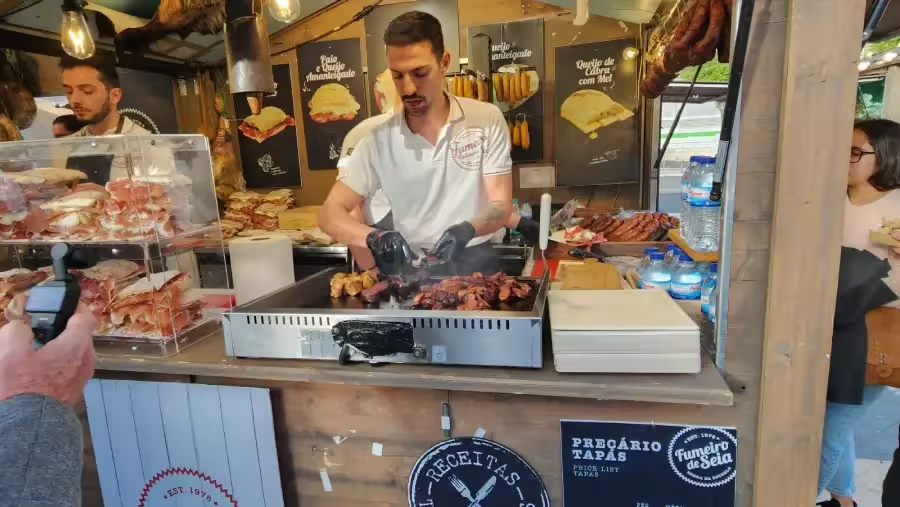
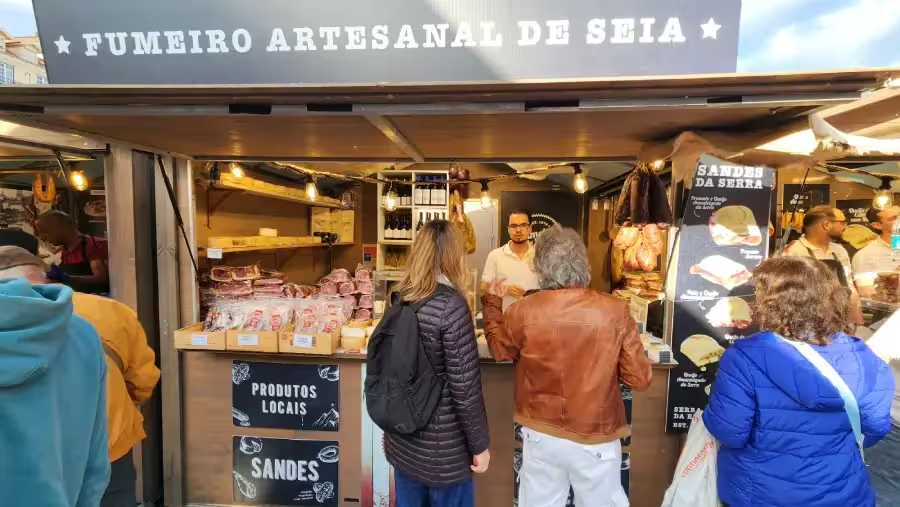
Belem Tower
Opening hours:
Tuesday to Sunday 9:30am-6pm (last entry 5:30pm)
Closed: 1st january, Easter, 1st may, june 13th e December 25th
Website: Belém Tower
Getting there:
Train
Belém Station
Tram
Route 15E
Bus
714 – 727 – 728 – 729 – 751
Tickets Regular: 15.00 €
Free with the Lisboa card
Belém Tower, or Torre de Belém, is one of Lisbon’s most famous landmarks and a UNESCO World Heritage Site. Constructed in the early 16th century, this fortified tower served as a ceremonial gateway to the city and a defense point against potential invasions.
The tower is a stunning example of Manueline architecture, characterized by intricate maritime motifs and decorative elements. Its strategic location along the Tagus River highlights its historical importance during the Age of Discoveries when explorers set sail for distant lands.
Unfortunatly , when we went to Visit it, the Belém Tower was closed for renovation
Belém is also home to several other attractions, including the Jerónimos Monastery and the Monument to the Discoveries. The area is also famous for its pastéis de Belém, a delicious custard tart that visitors should not miss. The combination of historical significance and culinary delights makes Belém a highlight of any trip to Lisbon.
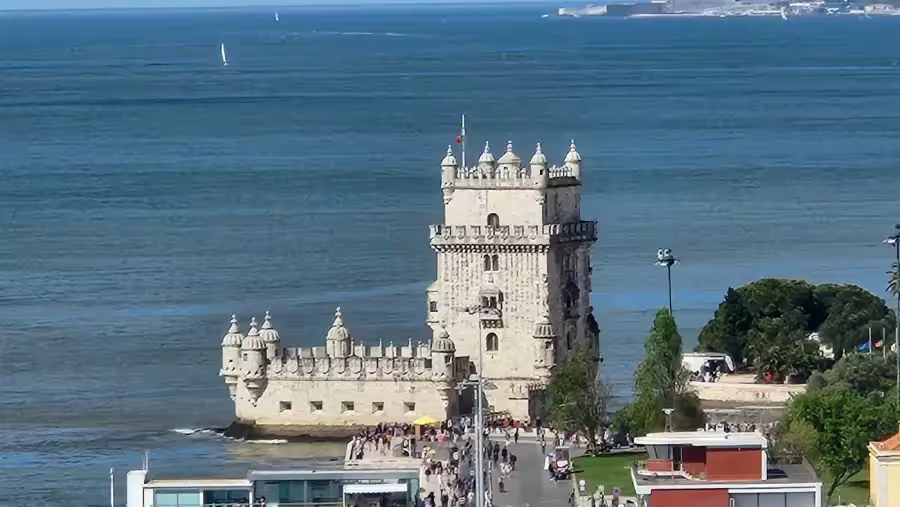
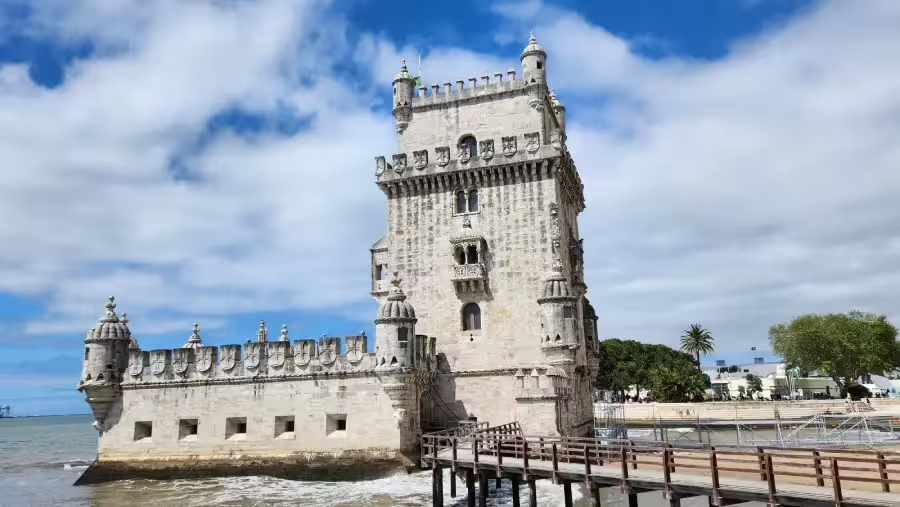
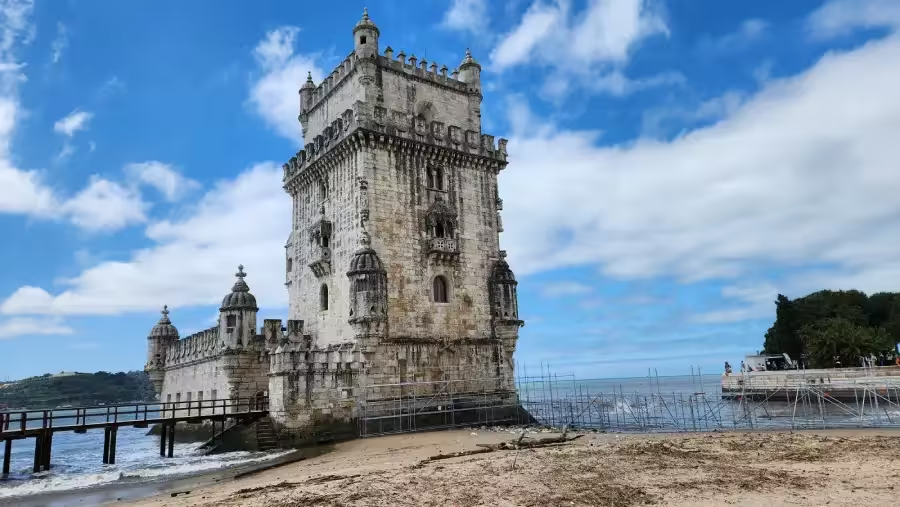
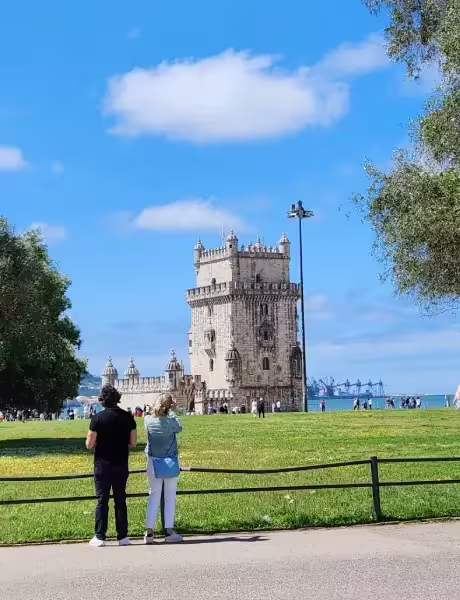
Padrao dos descobrimentos monument
Monument of the discoveries
Opening hours:
October to February – every day from 10:00 am to 6:00 pm (last entry 5:30 pm)
March to September – every day from 10:00 am to 7:00 pm (last entry 6:30 pm)
Closing days: 1 January, 1 May, 24, 25 and 31 December
Website: Monument to the Discoveries | Monument to the Discoveries
Getting there:
Train
Belém Station
Tram
Route 15E
Bus
714 – 727 – 728 – 729 – 751
Entrance fee is 10 Euros, but free is you have the Lisboa card, is part of the 52 museums and visitor attractions cover by the card.
Designed by the architect Cottinelli Telmo (1897 – 1948) and the sculptor Leopoldo de Almeida (1898 – 1975), the Monument to the Discoveries was erected for the first time in 1940, in an ephemeral form and integrated into the Portuguese World Exhibition.
Built in perishable materials, it had a light iron and cement structure, and the sculptural composition was molded in stape (a mixture of plaster and burlap species, consolidated by wooden or iron frames or railings).
In 1960, on the occasion of the commemorations of the 500th anniversary of the death of Infante D. Henrique, the Monument was rebuilt in concrete and rosal stone masonry from Leiria, and the sculptures in limestone masonry from Sintra.
In 1985 it was inaugurated as the Cultural Centre of the Discoveries. The architect Fernando Ramalho remodeled the interior, providing the Monument with a viewpoint, auditorium and exhibition rooms.
A stylized caravel sets sail at sea, carrying Prince Henry the Navigator at its bow and some of the protagonists (32) of overseas expansion and the culture of the time, navigators, cartographers, warriors, evangelizers, chroniclers and artists, are portrayed with the symbols that individualize them.
A stylized mast, with a North-South orientation, has on each side two Portuguese shields, with five corners, surrounded by a strip with 12 castles and in the center several fleurs-de-lis. Attached to the mast, three triangular, curved structures give the illusion of sails puffed by the wind.
The north face is formed by two stonework giants, where inscriptions in metallic letters can be seen:
On the left side, on an anchor: TO INFANTE D. HENRIQUE AND THE PORTUGUESE WHO DISCOVERED THE WAYS OF THE SEA;
On the opposite side, on a laurel wreath: ON THE V CENTENARY OF INFANTE D. HENRIQUE 1460 – 1960.
In the center, a flight of nine steps gives access to an atrium overlooking the entire area that surrounds the Monument. A second flight of five stairs, a portal with a round arch and a frame formed by the voussoirs, gives access to the interior of the monument.
The Monument is flanked by two armillary metal spheres, on two parallelepiped platforms.
Technical characteristics:
Height – 56m; Width – 20m; Length – 46m; Foundations – 20m
Central figure (Infante) – 9m Lateral figures (32) – 7m
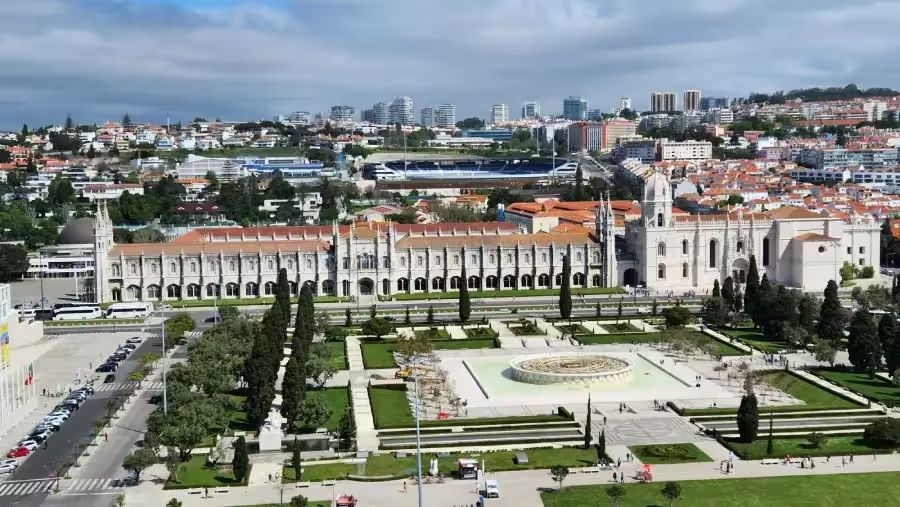
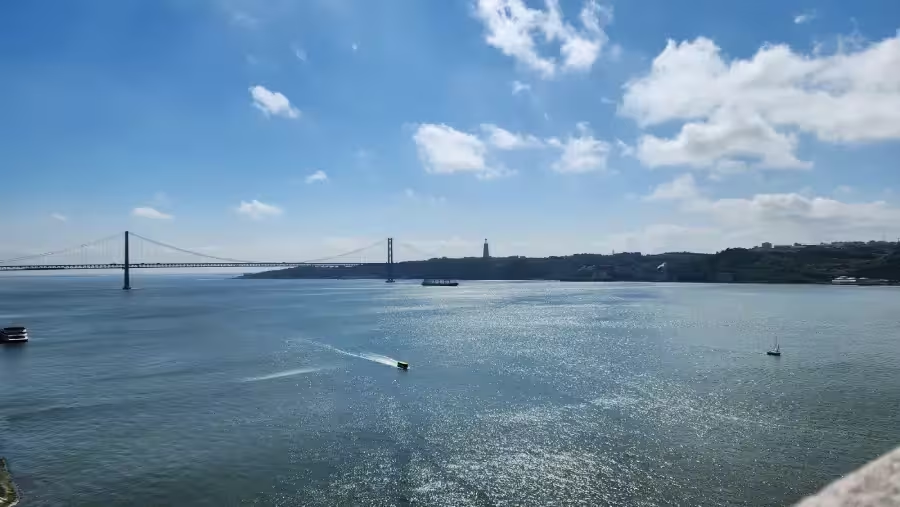
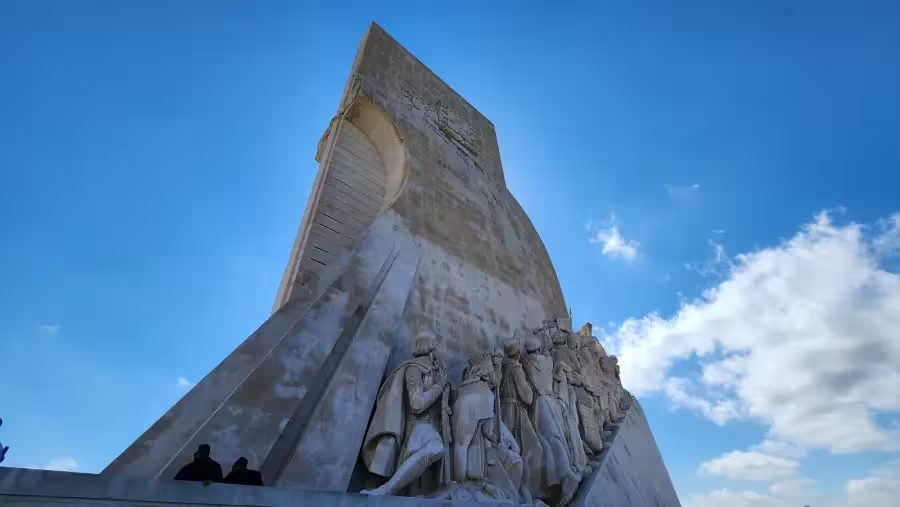
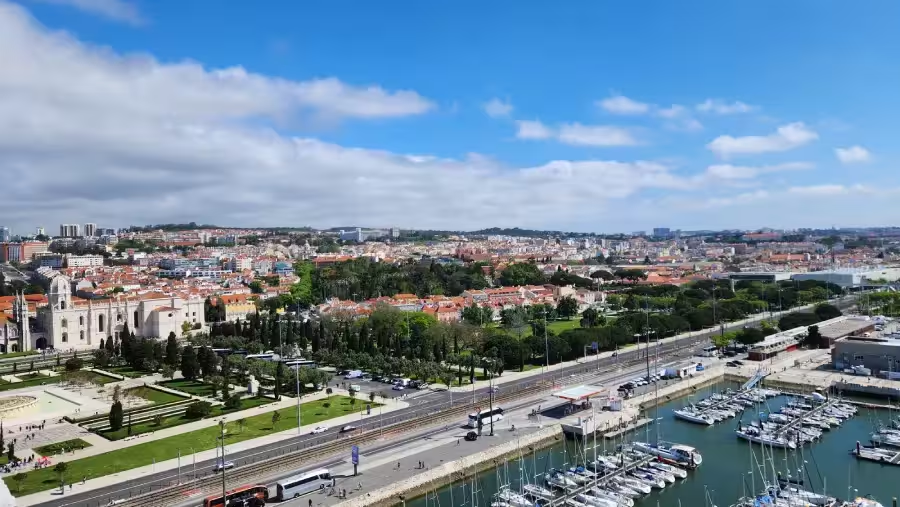

After visiting the Monument to Discoveries, there is a nice walk along the seawall, where you can find restaurants where you can enjoy the grilled sardines, cafes and craft shop,
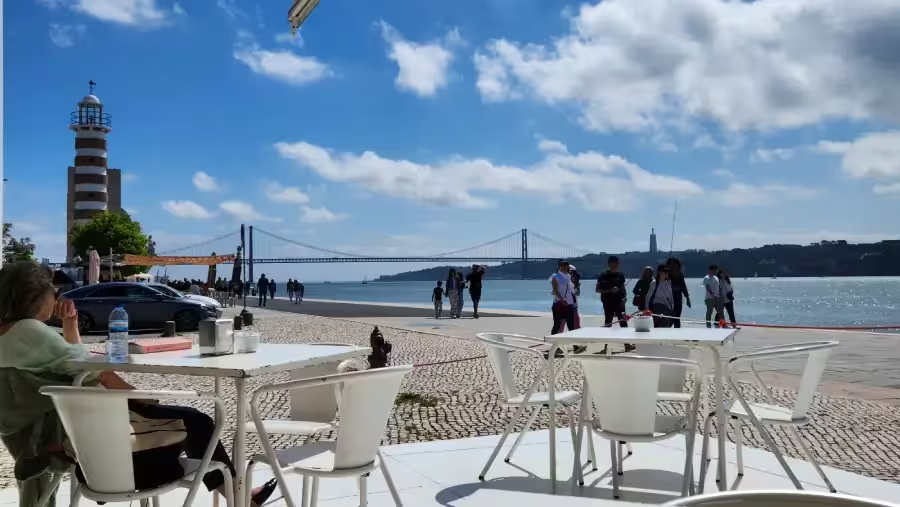



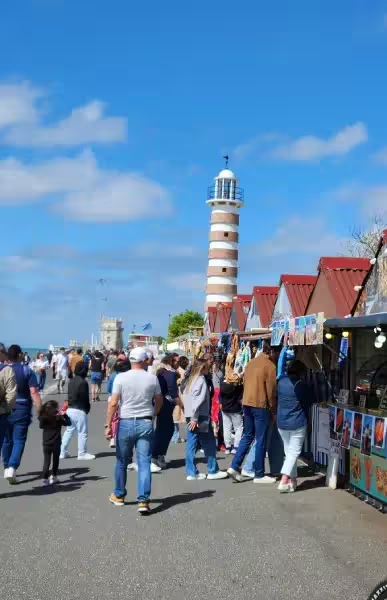
Jerónimos Monastery
Opening hours: Cloister
Tuesday to Sunday 9:30am-5:30pm (last entry at 5:00pm)
Church
Tuesday to Saturday 10:30am-5:00pm
Sundays and religious holidays 2pm-5pm
Ticket office closes at 4:30 pm
Closed: Mondays, January 1, Easter Sunday, May 1, June 13, December 25
For the Lisboa card owner, the entry is free is part of the 52 museums and visitor attractions cover by the card, otherwise the entry fee is 28 Euros, 33 US dollars.
Website: Jerónimos Monastery
Getting there:
Tram
Route 15E
Bus
714 – 727 – 728 – 729 – 751
This place is a must, I advice to go very very early in the morning if you want to have a chance to visit in good condition.
The Jerónimos Monastery, or Mosteiro dos Jerónimos, is a UNESCO World Heritage site located in the Belém district.
Construction began in 1502 to commemorate Vasco da Gama’s successful voyage to India, and it was completed in 1603. This stunning example of Manueline architecture features intricate carvings, maritime motifs, and beautiful cloisters.
As you enter the monastery, you are greeted by the grand façade adorned with statues of Portuguese explorers and saints.
The interior is equally impressive, with soaring vaulted ceilings and ornate chapels.
The highlight is the tomb of Vasco da Gama, which lies in a beautifully decorated chapel.
Visitors can wander through the peaceful cloisters, where the delicate columns and arches create a serene atmosphere. The monastery is not only a masterpiece of architecture but also a symbol of Portugal’s Age of Discovery.
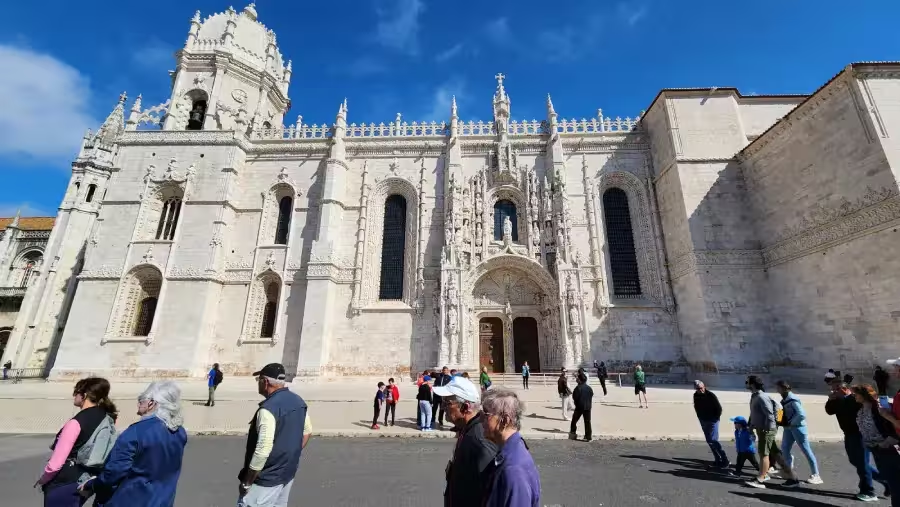
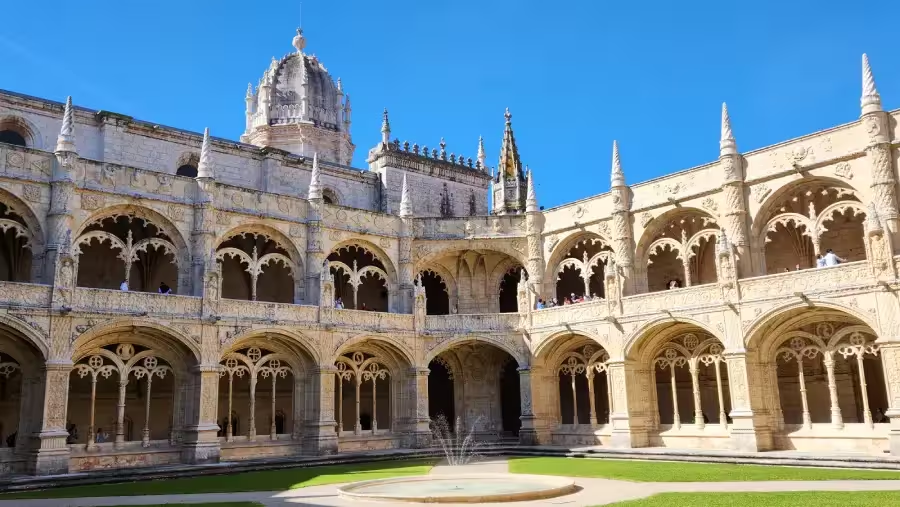
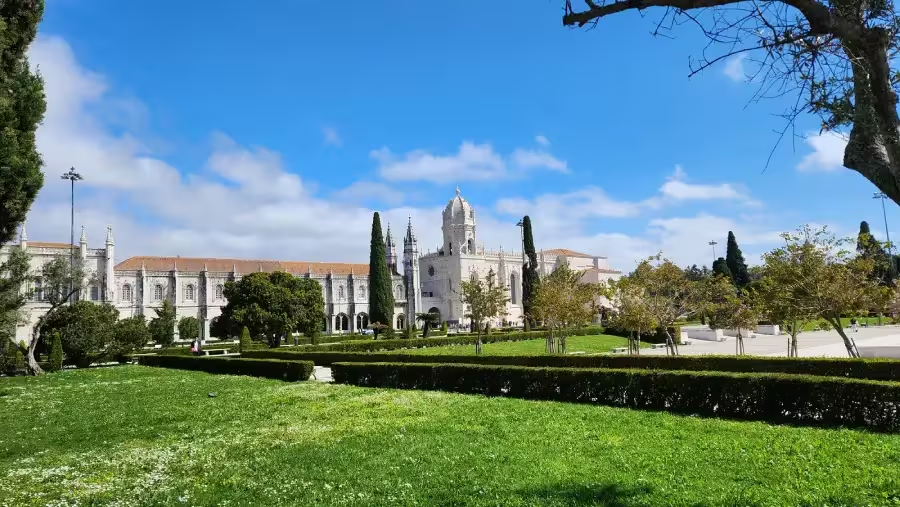
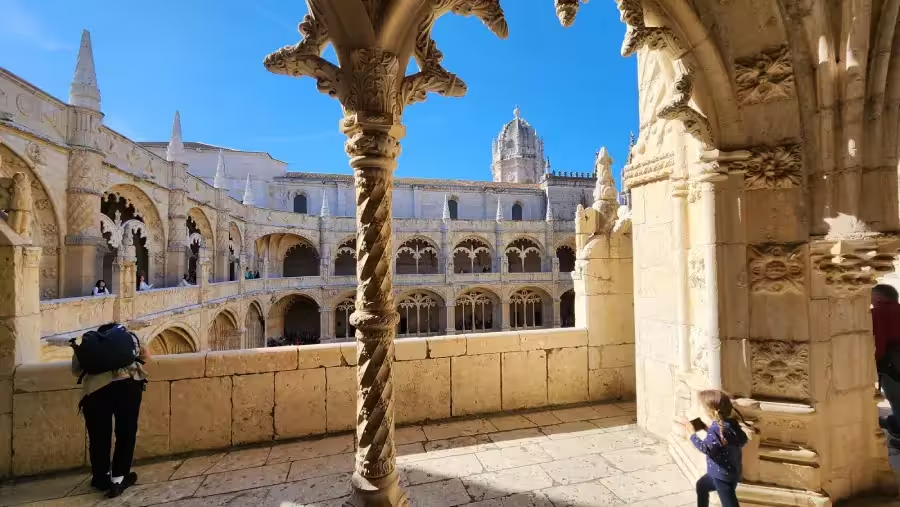
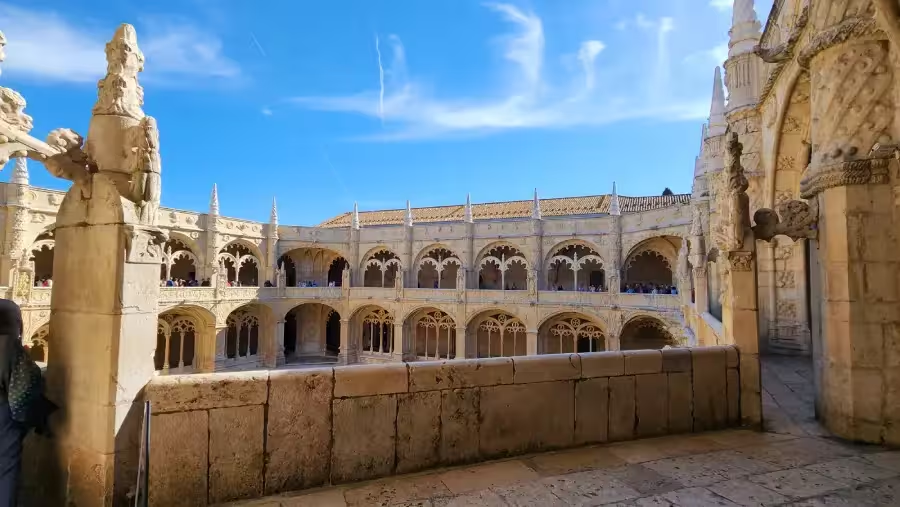
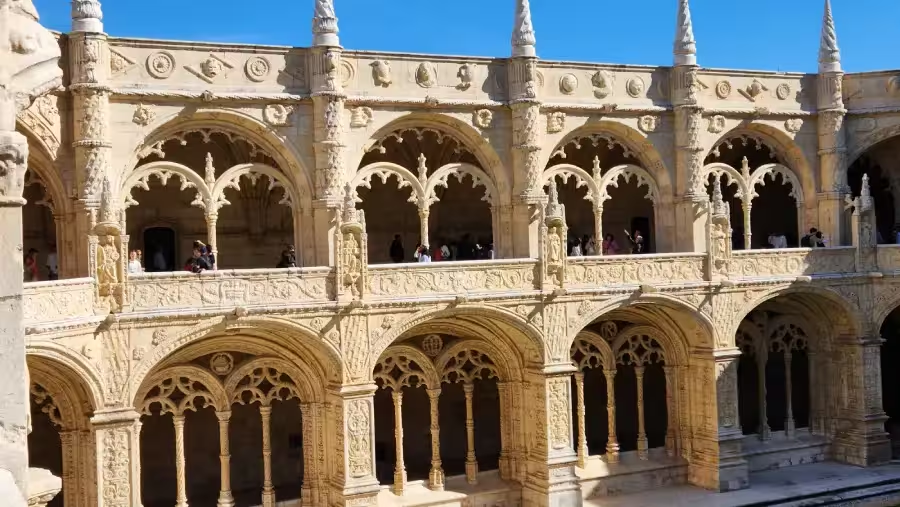
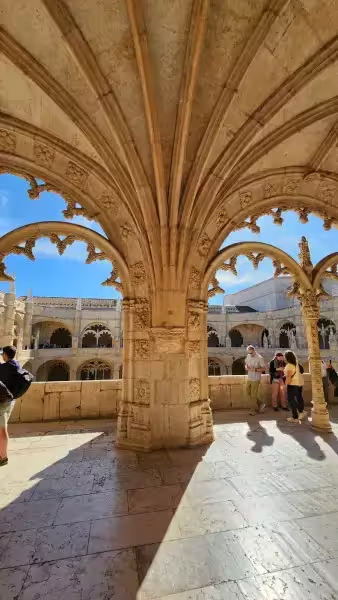
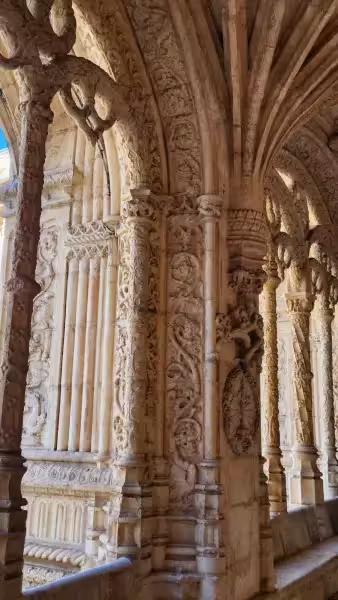
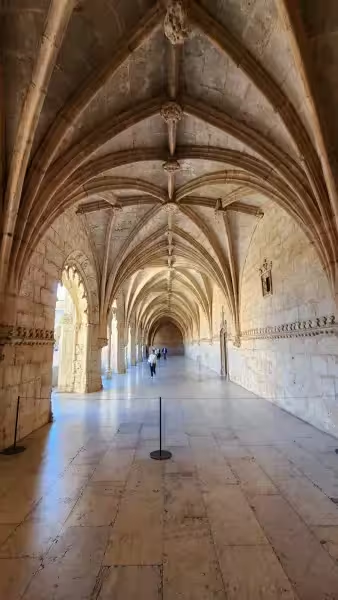
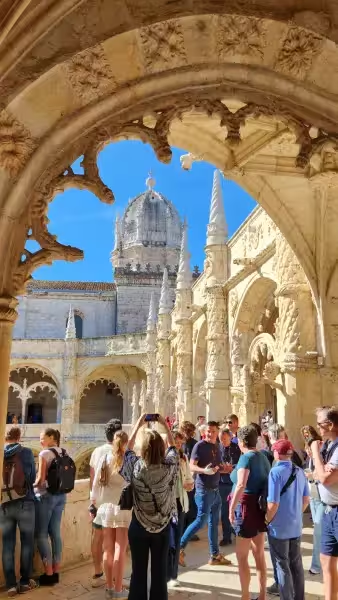
The famous Pastéis de Belém.
After tasting in different stores in Porto and Lisbon, definitely, the one from Belem are definitely the best one, in Porto they was too sweet. It’s a huge place and always big line up, take out or eating inside you have to be patient.
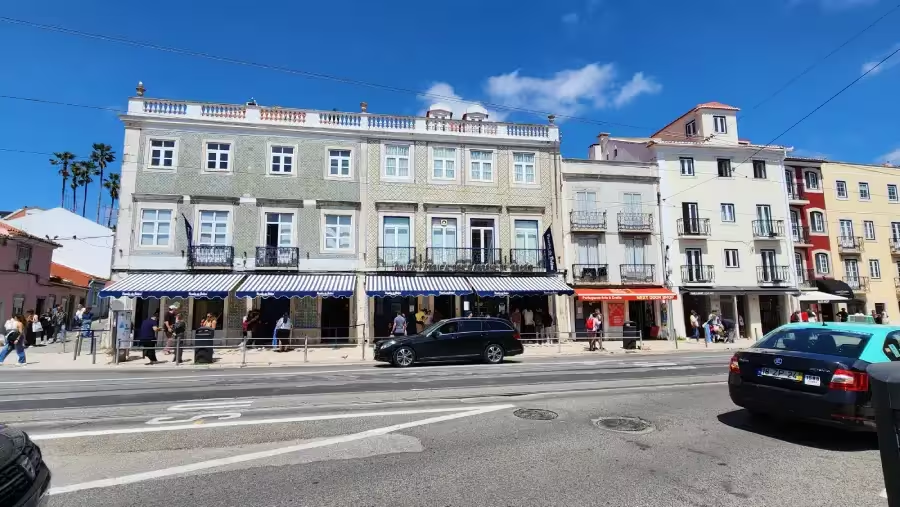
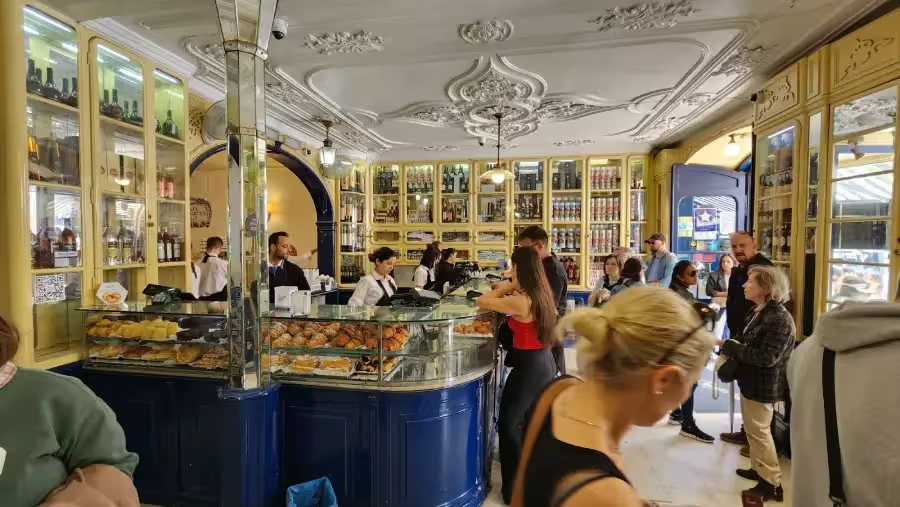
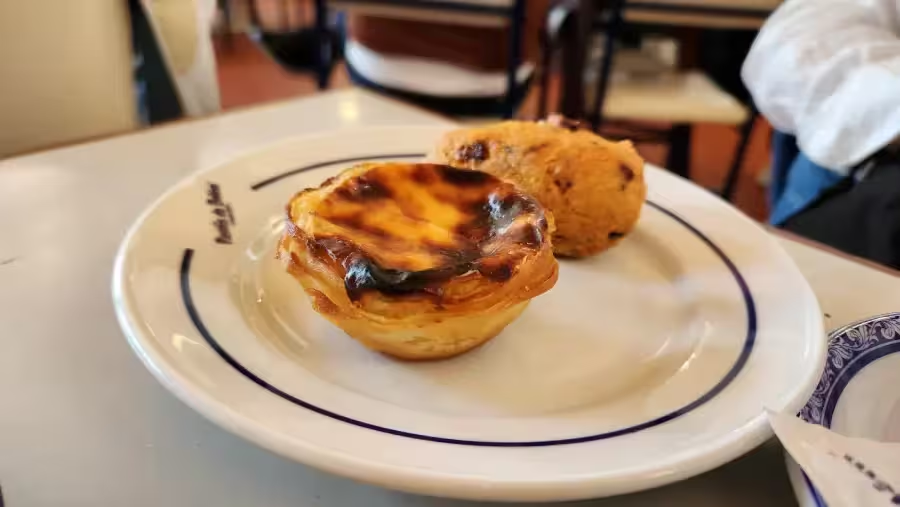
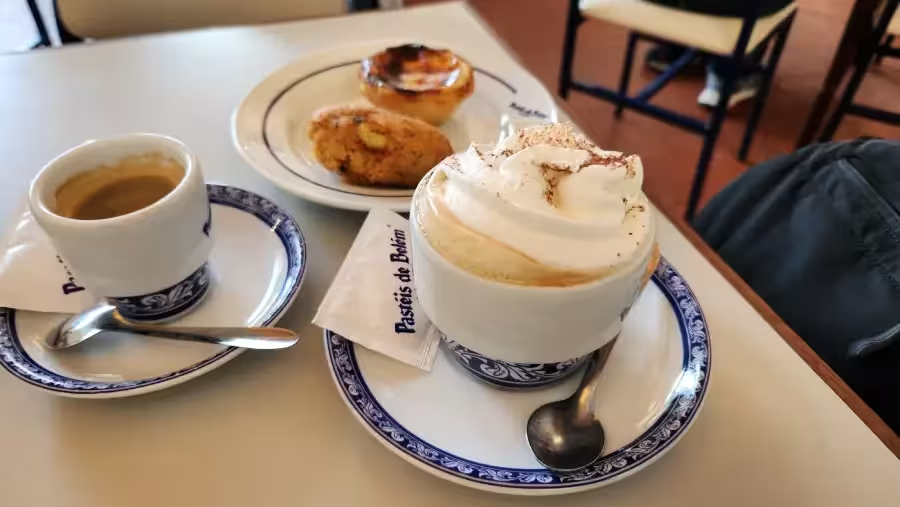
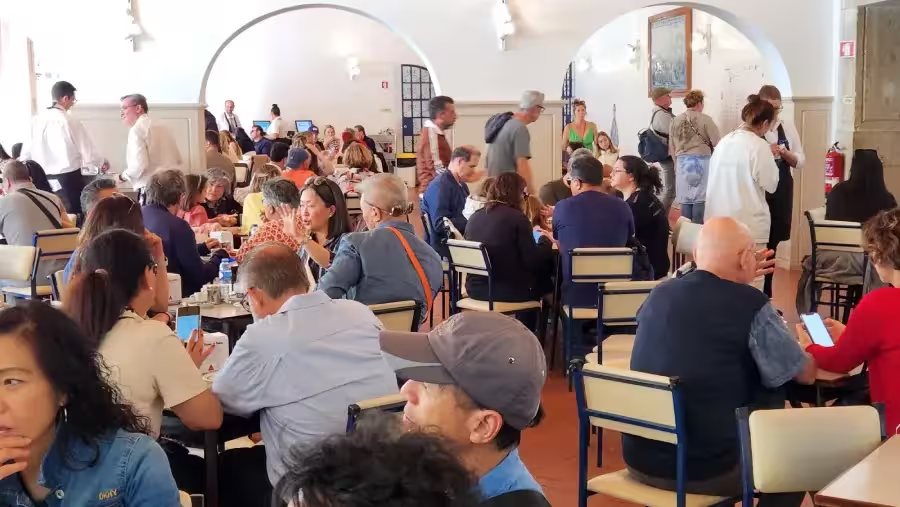
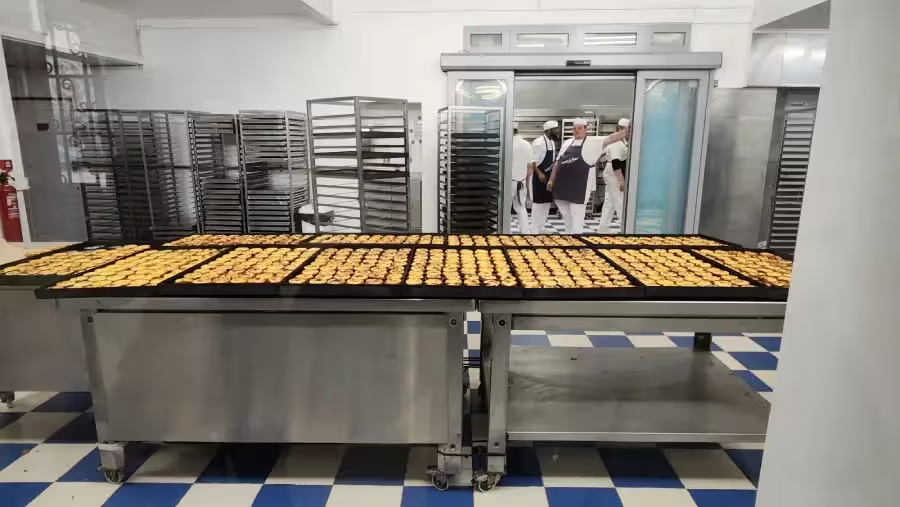
Castelo de São Jorge
Opening hours:
Summer Schedule (Mar – Oct):
Every day
From 09:00 am to 09:00 pm – With the last entry at 08:30 pm (30m before the closing of the Castle).
Winter Schedule (Nov – Feb):
Every day
From 09:00 am to 06:00 pm – With the last entry at 05:30 pm (30m before the Castle closes).
December 31st: The Castle of S. Jorge closes at 1:00 pm.
Closure: January 1-May 1-December 24 and 25
For security reasons, access to the patrol paths and towers closes to the public at 8:30 pm.
Website: São Jorge Castle
Entrance fee is 15 Euros, Otherwise with the Lisboa card owner, the entry is free is part of the 52 museums and visitor attractions cover by the card
Getting there:
From the Praça da Figueira, take the bus 737, heading towards Graça.From Martim Moniz, you can also find bus 737 heading towards Castelo.
this bus go directly to the castle, otherwise you can walk depending where you stay in Lisbon.
Like all tourist attraction in Lisbon, make sure you come very early in the morning.
Perched atop one of Lisbon’s seven hills, Castelo de São Jorge offers breathtaking panoramic views of the city and the Tagus River. This historic castle dates back to the 11th century and has served various purposes throughout its history, from a royal palace to a military fortress.
As we approach the castle, the walls and towers stand as a testament to Lisbon’s medieval past. Inside, we can explore the castle grounds, including the impressive battlements, gardens, and the small archaeological museum that showcases artifacts from the site’s long history.
Walking along the ramparts provides a unique perspective of Lisbon, with its colorful neighborhoods and iconic landmarks like the 25 de Abril Bridge and the Christ the King statue.
The castle is particularly enchanting at sunset.
The surrounding Alfama district, with its narrow streets and traditional Fado music is a must.
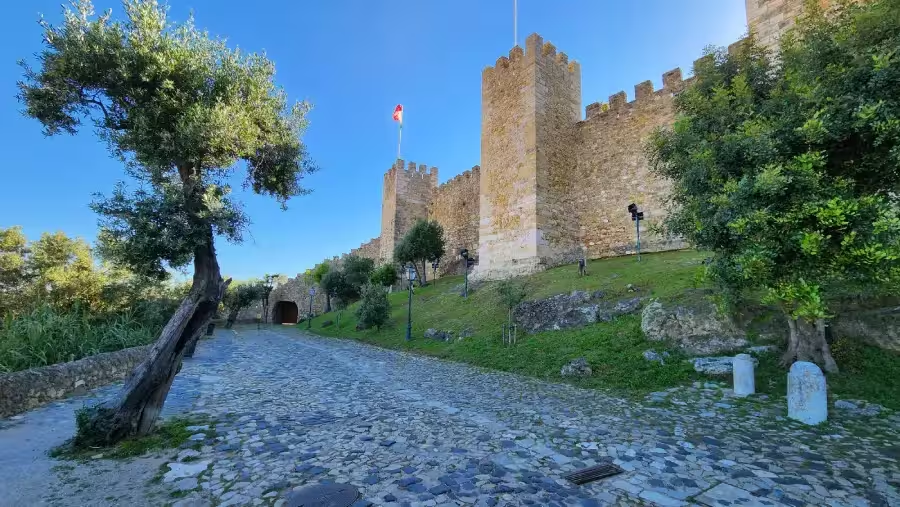
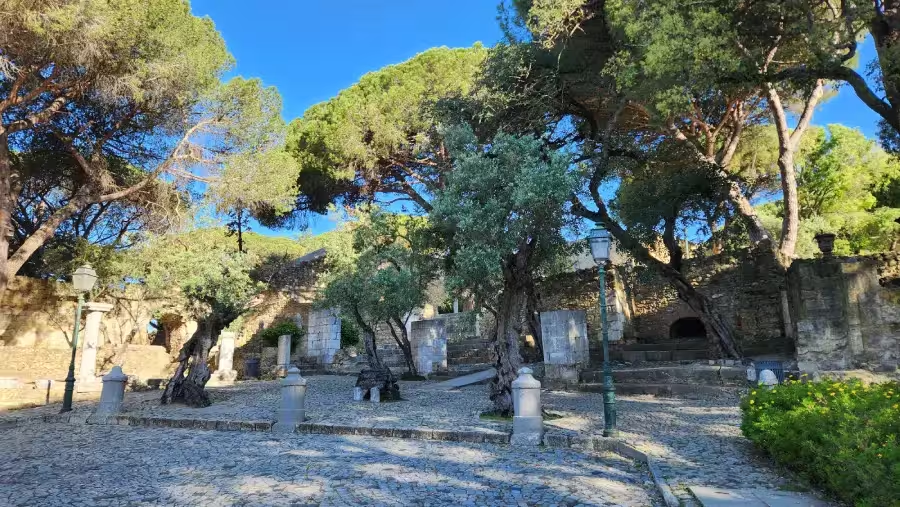
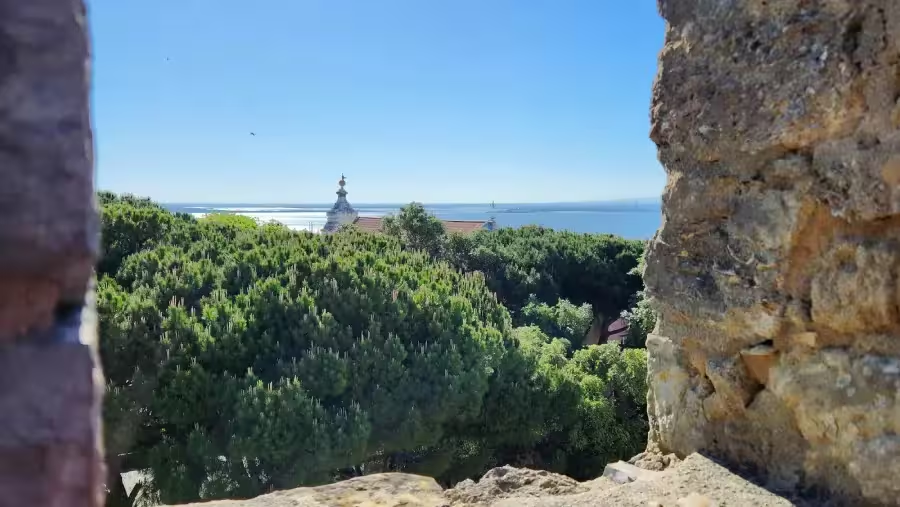
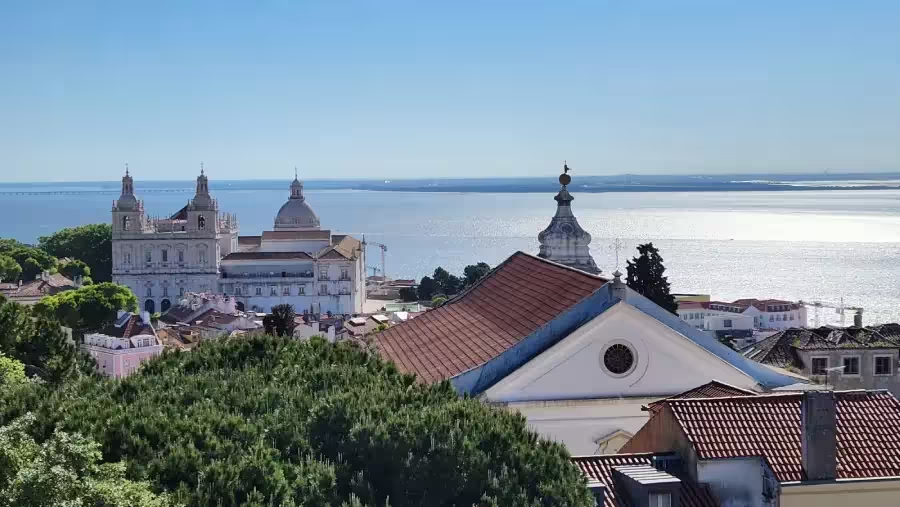
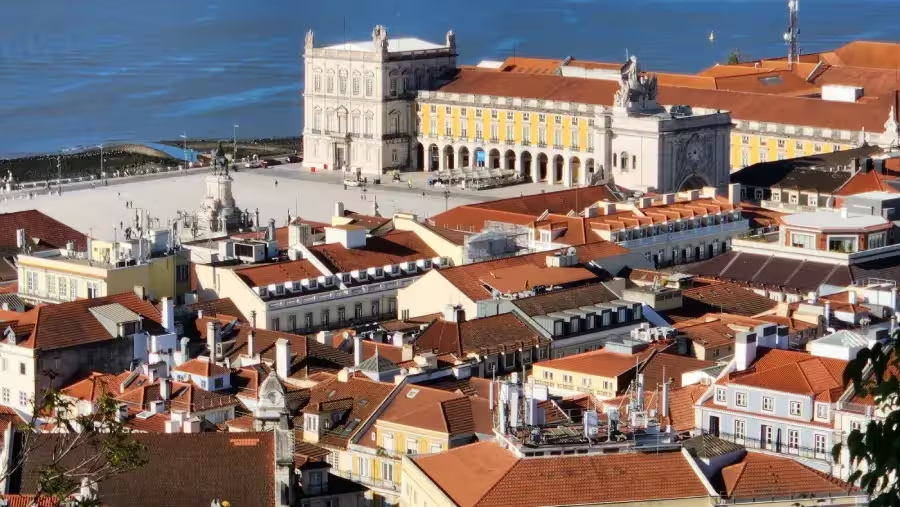
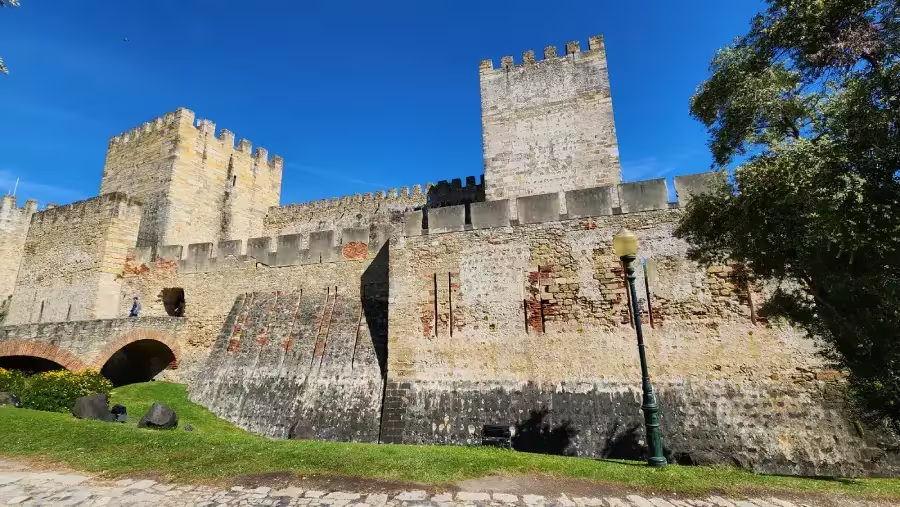
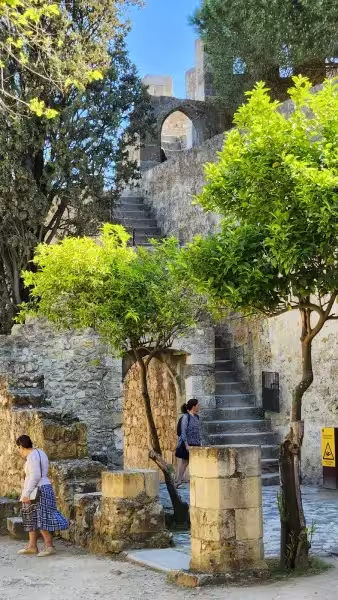
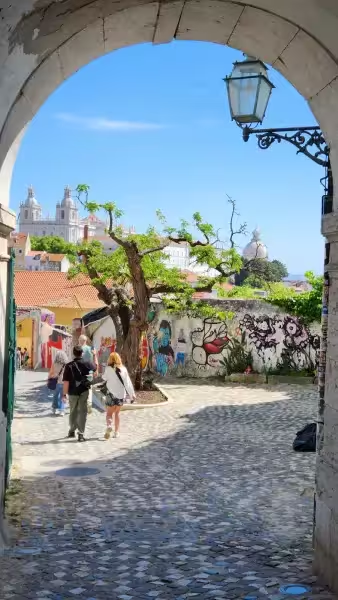
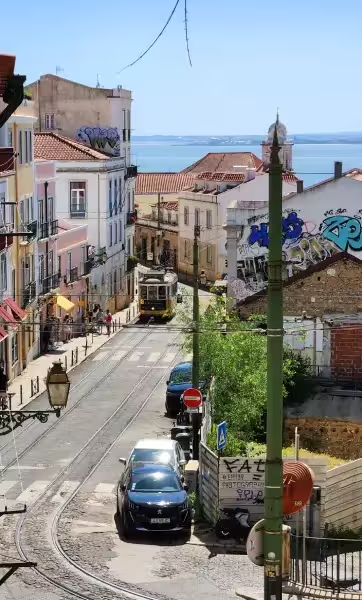
Santa Justa Tower
Opening hours:
May to October: 7 am – 11 pm
November to April: 7 am – 10 pm
Website: Santa Justa Lift in Lisbon –
Getting there:
Very easy to find is right in the city center, very close to the Praça da Figueira.
Entrance fee:
Elevator: € 6 (US$ 6.85) round trip. But free with the Lisboa card.
The Santa Justa Lift, or Elevador de Santa Justa, is one of the most recognizable structures in Lisbon. Completed in 1902, this iron lift was designed by the architect Raoul Mesnier du Ponsard, who was inspired by the Eiffel Tower.
Standing at 45 meters tall, the lift connects the lower streets of the Baixa district with the higher Carmo Square.
Taking a ride in the lift is an experience in itself. The interior features intricate ironwork, and as you ascend, the views become increasingly breathtaking.
At the top, a viewing platform offers a 360-degree panorama of Lisbon, including sights like the Castelo de São Jorge and the Tagus River.
Unfortunately at the time of my visit, the top platform was closed for renovation, but we still can go to the one just below.
After visiting the tower, take a leisurely stroll through the charming streets of the Baixa district, where you can indulge in local delicacies and shop for unique souvenirs.
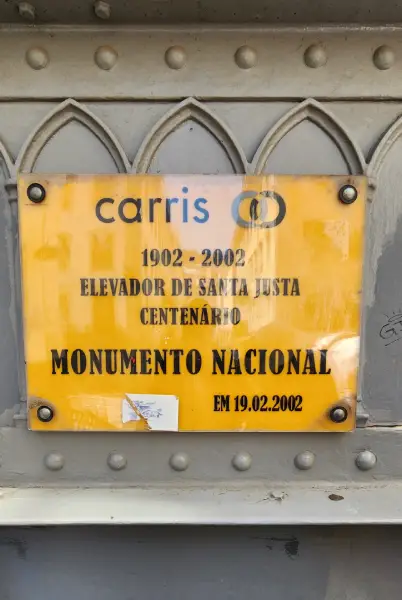
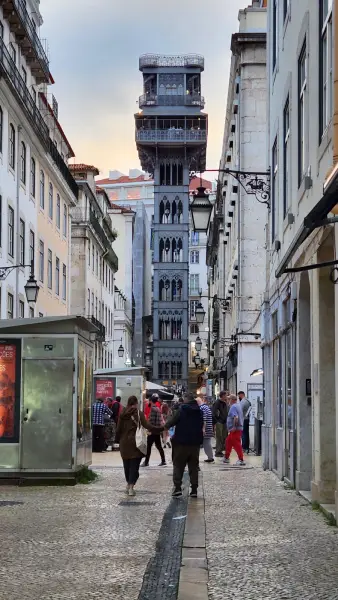
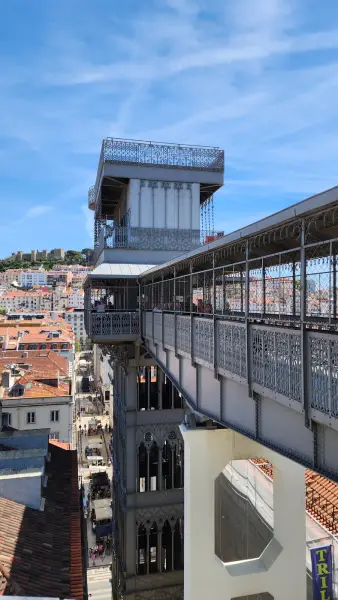
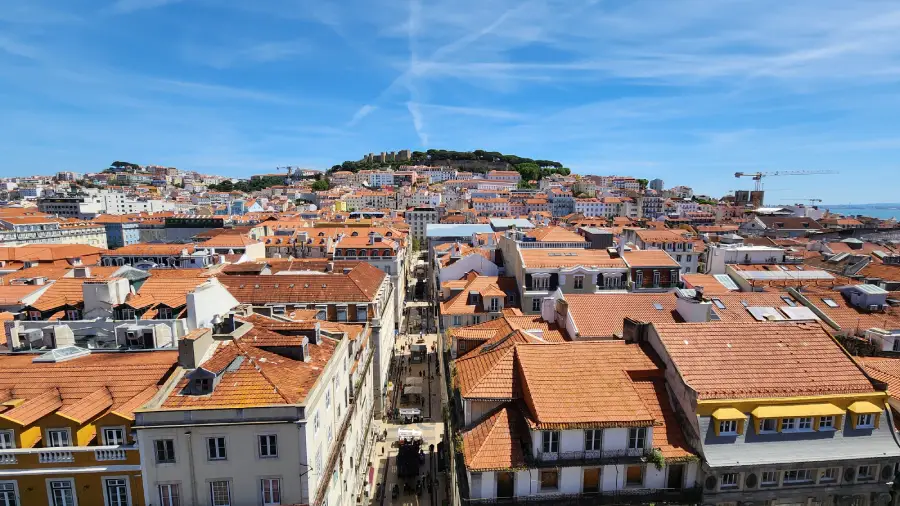
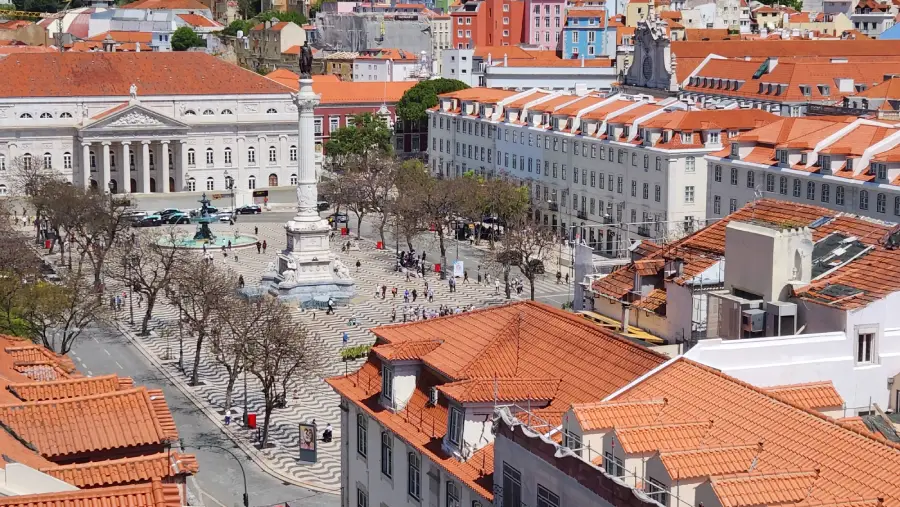
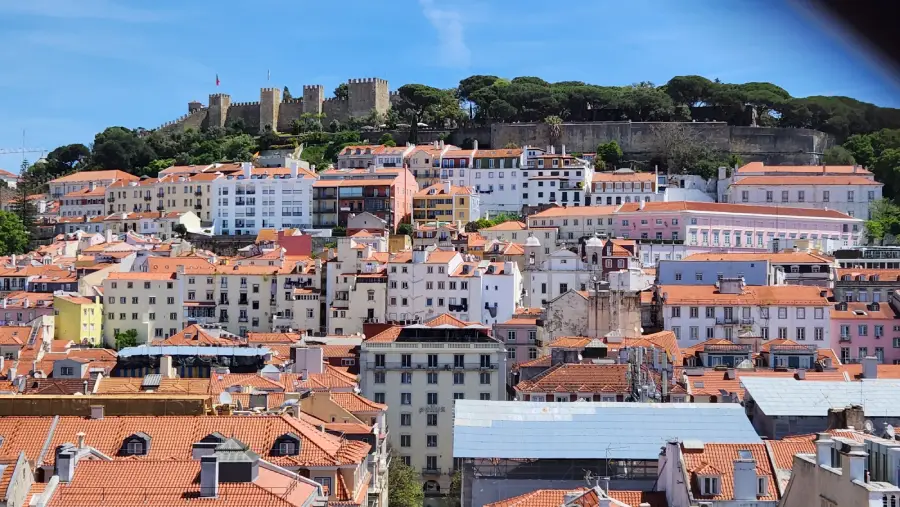
Covento do Carmo
Opening hours:
From Monday to Saturday:
November to April: 10 a.m. – 6 p.m. Last entry at 5.40 p.m.
May to October: 10 a.m. – 7 p.m. Last entry at 6.40 p.m.
Easter week: 10 a.m. – 7 p.m. Last entry at 6.40 p.m.
26th December to 6th January : 10 a.m. – 7 p.m. Last entry at 6.40 p.m.
Closed:
Sundays, 1st January, 1st May and 25th December.
Website: Carmo Archaeological Museum
Getting there:
Public transport By Lift: Elevador de Santa Justa, By Tram: Nº 28 (Chiado) By Bus: Nº 758, By Train: Rossio Station, By Underground: Baixa – Chiado Station.
The Convento do Carmo, or Carmo Convent, is a haunting yet beautiful reminder of the 1755 earthquake that devastated Lisbon.
Founded in 1389, the convent was once a flourishing Gothic structure, but much of it was destroyed during the earthquake. Today, the ruins stand as a poignant symbol of resilience.
Entering the convent, you are immediately struck by the open-air nave, where the once-majestic roof is now missing, allowing sunlight to filter through.
The remains of the Gothic arches and walls create a dramatic atmosphere, inviting reflection on the fragility of life and the power of nature.
Inside the convent, we can explore a small archaeological museum that houses religious artifacts and cultural treasures from various periods. The serene environment of the convent is perfect for those seeking a moment of contemplation amidst the bustling city.
The surrounding Chiado neighborhood is vibrant, filled with cafés, shops, and cultural venues.
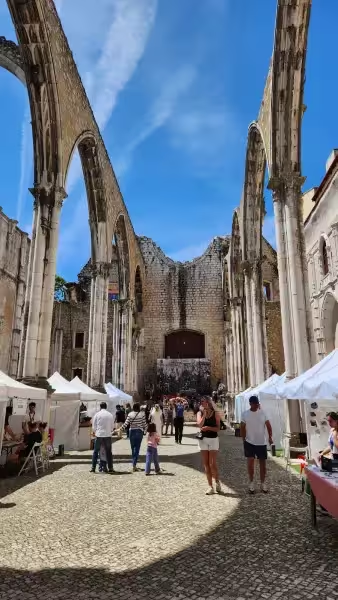
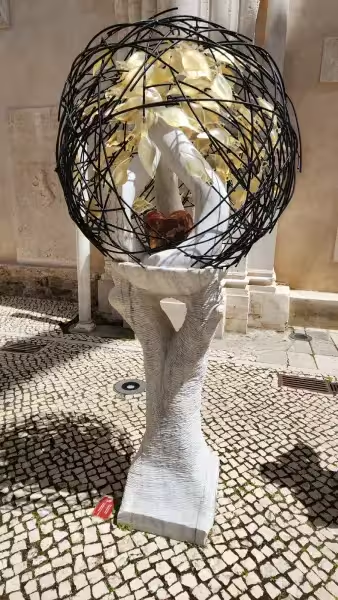
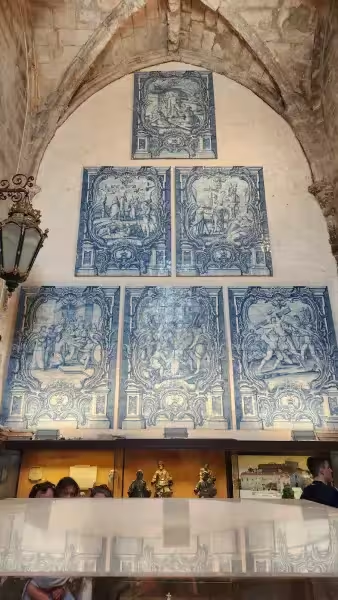
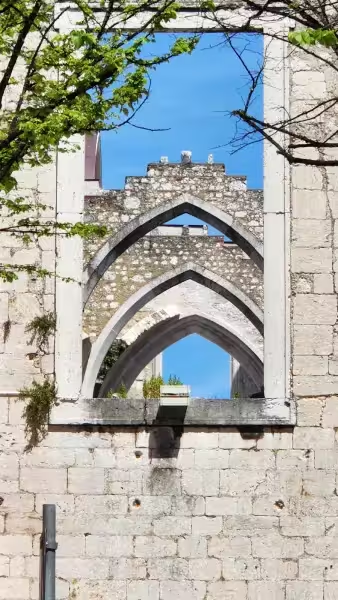
Miradouro de Santa Lucia
Getting there:
Take the tram 12 or the famous 28
Is in the heart of Lisbon, Santa Lucia is a hidden gem that offers a unique blend of breathtaking views, vibrant culture, and rich history.
One of the main attractions of Santa Lucia is its stunning viewpoint, known as Miradouro de Santa Lucia.
From here, you can gaze out over the iconic terracotta rooftops of the Alfama district, the majestic São Jorge Castle, and the sparkling waters of the Tagus River.
The viewpoint is particularly enchanting at sunset.
Santa Lucia is steeped in history. The area is part of Alfama, one of Lisbon’s oldest neighborhoods, which dates back to the Moorish period. Walking through its narrow, winding streets feels like stepping back in time, with traditional azulejos (decorative ceramic tiles) adorning many buildings. The architecture reflects a blend of different eras, showcasing the resilience and evolution of Lisbon through centuries of change.
As you walking through the streets, you’ll encounter local artisans, quaint shops, and lively cafes. The area is known for its Fado music, a traditional genre that expresses the soul of Portuguese culture.
Many local bars and restaurants host Fado performances, allowing visitors to enjoy the poignant melodies and heartfelt lyrics that tell stories of love, loss, and longing.
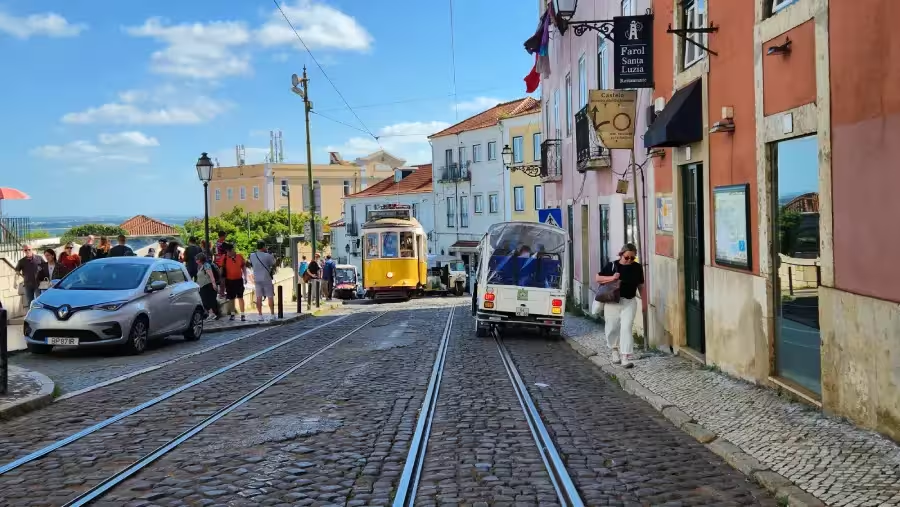
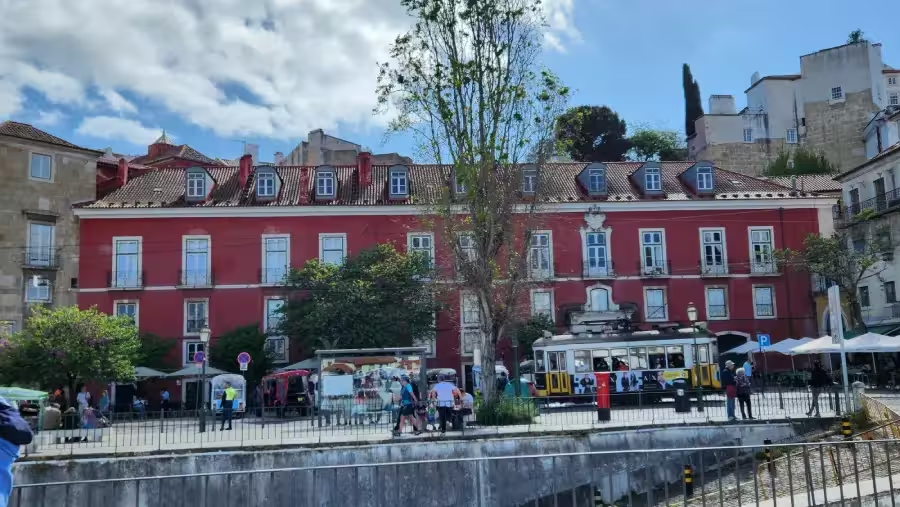
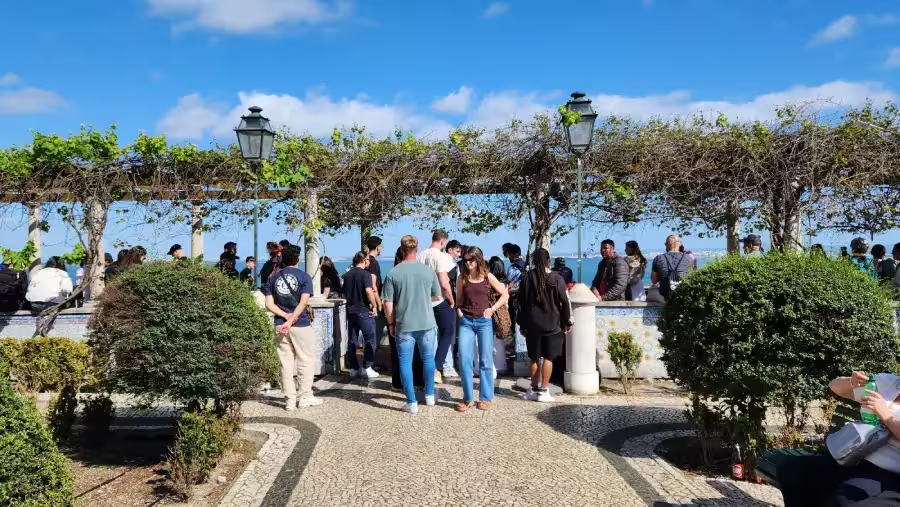
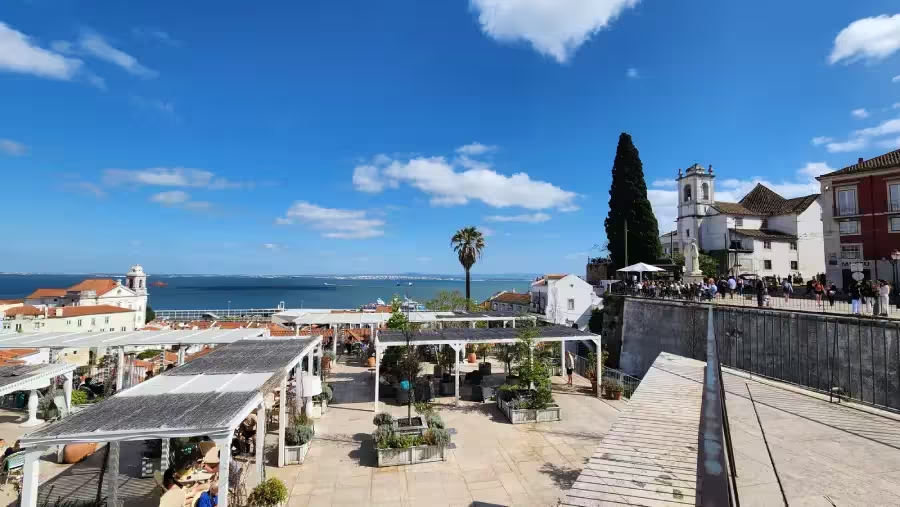
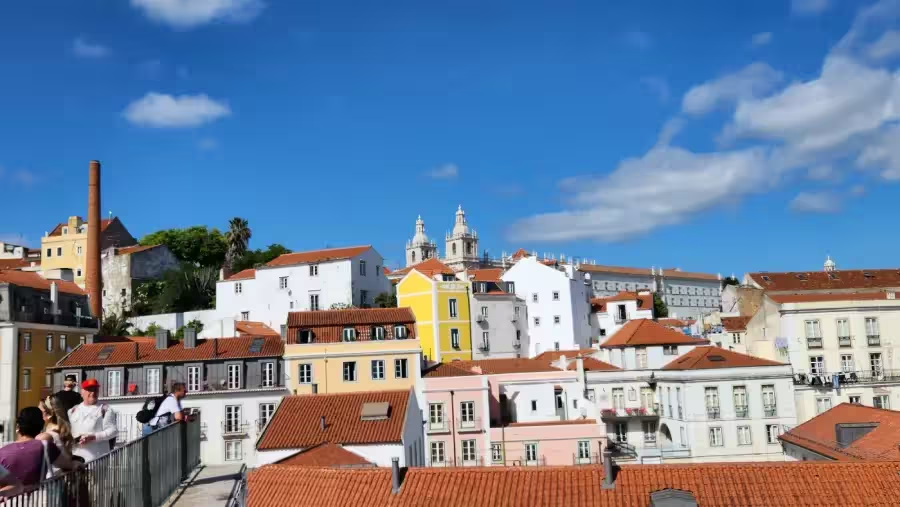
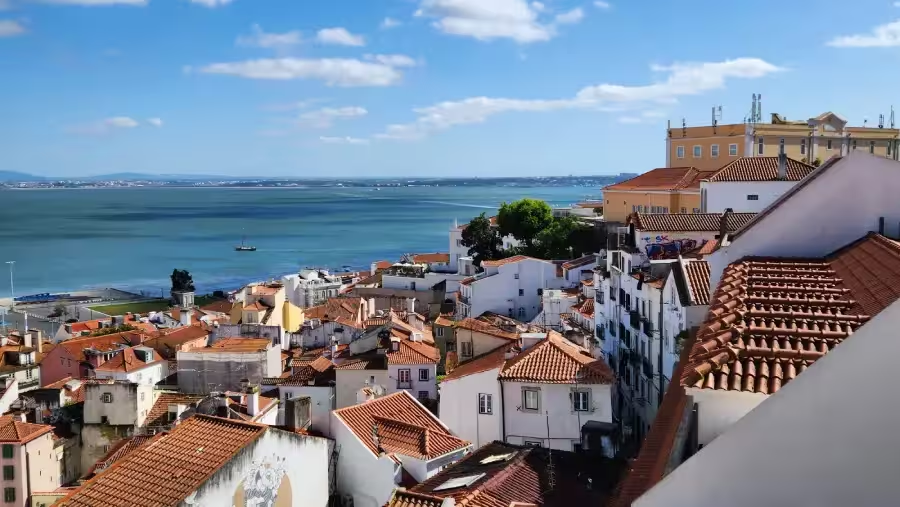
Where to eat in Lisbon.
CAFE GELO: Ice – JFamily Restaurants
LUZ BOA:
CARMO:
TABERNA DA ESQUINA:
MARIA PEIEIRA
ARARATE
2 Responses